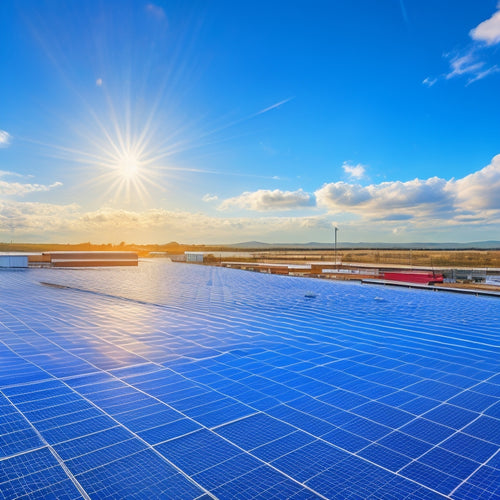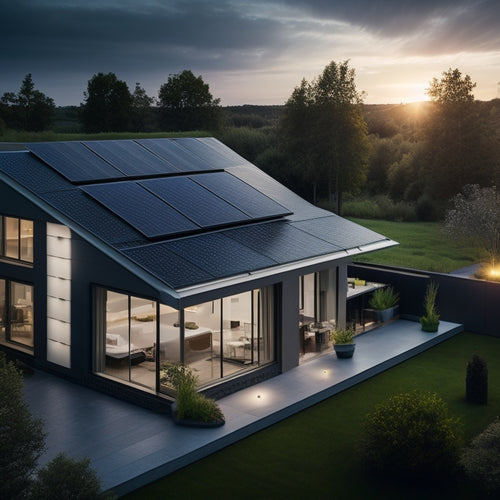
What Fuels Off-Grid Home Energy Independence?
Share
You've opted for a self-sufficient lifestyle, relying on a diverse range of renewable energy sources, energy-efficient systems, and sustainable practices to power your off-grid home. Solar power, wind energy, biogas, and geothermal systems provide reliable and clean energy, while energy storage systems like battery backup systems guarantee a steady supply. Efficient home insulation methods, such as air sealing techniques and thermal mass elements, minimize heat loss and gain. By reducing energy consumption habits and implementing grid-free water purification systems, you're well on your way to achieving energy independence. Now, investigate how monitoring your energy usage can optimize your off-grid system's performance.
Overview
- Renewable energy sources like solar, wind, biogas, geothermal, and innovative solutions fuel off-grid home energy independence.
- Energy storage systems, including battery backup systems, ensure reliable power during outages or when renewable sources are unavailable.
- Effective integration of renewable sources, energy storage, and energy-efficient practices enables off-grid homes to achieve energy independence.
- Energy monitoring and tracking consumption patterns optimize energy efficiency and support informed decision-making in off-grid homes.
- A combination of behavioral changes, appliance upgrades, and lifestyle adjustments reduce energy consumption habits and support off-grid energy independence.
Harnessing Renewable Energy Sources
Nearly 80% of the world's energy consumption still relies on fossil fuels, which not only harm the environment but also deplete finite resources.
You're likely seeking alternatives that guarantee energy independence. Fortunately, various renewable energy sources can power your off-grid home. For instance, solar power offers reliable energy for off-grid locations, promoting energy independence solar power solutions.
Additionally, biogas energy employs organic waste for clean-burning fuel via anaerobic digestion, reducing waste disposal costs. You can tap into wind energy using wind turbines, which convert wind kinetic energy into electricity.
Hydro power, generated from flowing water, is another viable option. Geothermal systems, which draw on heat from the earth's core, can provide both heating and cooling.
Biomass energy, derived from organic matter, can be applied to generate electricity and heat. By leveraging these community resources and adopting sustainable practices, you can break free from fossil fuels and achieve energy independence.
Solar Power for Appliances
You'll need to take into account two key aspects when integrating solar power for appliances into your off-grid home energy system: energy harvesting methods that maximize your solar panel output, and efficient appliance selection that minimizes energy consumption.
To maximize energy harvest, it's crucial to employ high-efficiency solutions that incorporate advanced MPPT technology for peak energy capture high-efficiency solar charging solutions. Your energy harvesting approach will depend on factors like panel orientation, tracking systems, and battery storage capacity.
Energy Harvesting Methods
Several solar power systems are capable of generating enough electricity to power your off-grid home, and selecting the right one depends on your energy needs and budget.
You'll want to evaluate alternative energy harvesting methods to guarantee a reliable and consistent energy supply. Many off-grid solar kits, such as high-efficiency solar panels, offer exceptional solar performance and easy installation, making them an attractive option.
Wind energy, for instance, can be utilized using turbines to generate electricity. Biomass conversion, geothermal heating, and micro hydro systems are other viable options.
You can also investigate innovative solutions like piezoelectric devices, thermoelectric generators, and energy scavenging systems that convert kinetic energy into electrical energy.
Efficient Appliance Selection
With your off-grid home's energy harvesting methods in place, it's time to optimize your energy usage by selecting appliances that can efficiently run on solar power.
You'll want to choose appliances with low wattage and high energy efficiency ratings to minimize your energy consumption. For example, consider energy efficient cooking appliances like induction cooktops or solar ovens. These alternatives can considerably reduce your energy usage while still providing the functionality you need.
Additionally, integrate smart home technology to monitor and control your energy usage in real-time, ensuring you're staying within your energy budget.
Energy Storage System Options
You're now considering energy storage system options to guarantee a reliable off-grid power supply.
Battery backup systems will be a key focus, as they provide a buffer against intermittent renewable energy sources.
You'll also investigate how to integrate these systems with your renewable energy setup to achieve seamless power shift.
Battery Backup Systems
When designing an off-grid home energy system, I consider battery backup systems an essential component, as they provide a reliable source of power during grid outages or when renewable energy sources are unavailable.
As you select a battery backup system, consider factors like battery lifespan, which can range from 5 to 15 years, depending on the technology and charging cycles. Proper maintenance strategies, such as regular monitoring and equalization, can extend lifespan.
Installation tips include ensuring system compatibility and following safety measures, like proper ventilation and electrical connections. Cost considerations, performance optimization, and environmental impact are also significant.
Stay up-to-date with technology advancements, like lithium-ion batteries, to maximize your system's efficiency and freedom.
Renewable Energy Integration
As you've selected a reliable battery backup system, it's time to examine the heart of off-grid home energy independence: integrating renewable energy sources into your system.
You'll want to investigate options like wind energy, geothermal systems, biomass energy, and micro hydro solutions to generate power. Conducting an energy audit will help you determine which sources are best suited for your location and energy needs.
Be certain to research renewable incentives and off-grid regulations in your area to guarantee compliance. By integrating these sustainable practices, you'll be well on your way to achieving energy independence.
Consider community energy initiatives, where you can share resources and knowledge with like-minded individuals, to further solidify your off-grid lifestyle.
Efficient Home Insulation Methods
Three critical factors contribute to an off-grid home's energy independence: efficient insulation, strategic window placement, and renewable energy systems.
As you design your off-grid home, you'll want to prioritize insulation to minimize heat loss and gain. This involves more than just adding insulation materials; it requires a thorough approach.
You'll need to employ air sealing techniques to eliminate gaps and cracks in your home's envelope. Additionally, consider incorporating thermal mass elements, such as concrete or brick, to absorb and release heat.
Reducing Energy Consumption Habits
By optimizing your insulation strategy, you've taken a notable step toward reducing your energy consumption.
Now, it's time to focus on behavioral changes that will further minimize your energy needs. Making lifestyle adjustments, such as turning off lights and appliances when not in use, can notably impact your energy consumption.
Implementing energy-efficient habits, like using power strips to plug in electronics and turning them off with one switch, can also make a difference.
Additionally, upgrading to energy-efficient appliances and lighting can reduce your energy usage.
Grid-Free Water Purification Systems
Most off-grid homeowners require approximately 20-50 gallons of purified water per day for drinking, cooking, and hygiene.
To achieve grid-free water purification, you'll need a reliable system that utilizes nature's resources. Rainwater collection is an essential step, as it provides a consistent supply of raw water.
Next, you'll need a natural filtration system to remove impurities and contaminants. This can be achieved through a combination of sedimentation, filtration, and disinfection processes.
By leveraging these methods, you can enjoy an uninterrupted supply of clean water, free from the constraints of municipal water grids.
With a well-designed grid-free water purification system, you'll be one step closer to achieving true off-grid independence.
Off-Grid Home Energy Monitoring
Reliability is the backbone of off-grid home energy independence, and energy monitoring is the pulse that keeps it beating. You need to know exactly how much energy you're producing and consuming to maintain independence. Advanced monitoring technology provides real-time tracking of your energy usage, giving you revelations into consumption patterns and performance metrics. With data analytics, you can identify areas for improvement, optimize energy efficiency, and make data-driven decisions about your smart home.
| Monitoring Features | Benefits |
|---|---|
| Real-time energy tracking | Optimizes energy efficiency |
| Customizable energy dashboards | Provides clear performance metrics |
| Automated load management | Guarantees energy independence |
| Advanced data analytics | Uncovers hidden consumption patterns |
Frequently Asked Questions
Can I Finance an Off-Grid Energy System Through Government Incentives?
You can investigate financing options for your off-grid energy system through government grants, energy loans, and tax credits, which can considerably reduce upfront costs, making energy independence more accessible and affordable for you.
How Do I Ensure a Reliable Off-Grid Energy Supply During Winter?
You'll need to optimize winter energy storage by sizing your battery bank correctly and ensuring your solar panel efficiency isn't compromised by snow cover, so you can maintain a reliable off-grid energy supply during the cold winter months.
Are Off-Grid Homes More Prone to Electrical Fires or Shocks?
You prioritize fire prevention and electrical safety by ensuring your off-grid home's system is designed and installed by a certified professional, following NEC standards, and performing regular maintenance to minimize risks of electrical fires or shocks.
Can I Sell Excess Energy Back to the Grid From My Off-Grid System?
You can sell excess energy back to the grid through net metering, offsetting your utility bills; consider energy storage options to optimize this benefit, ensuring a seamless exchange and maximizing your off-grid system's efficiency.
Do Off-Grid Homes Require Special Insurance Coverage or Policies?
You're living the dream, off-grid and free, but don't assume your standard homeowners' policy covers your independence. You'll need specialized off-grid insurance, considering unique policy factors like energy storage, generator liability, and renewable energy equipment risks.
Ready to Buy
As you've now learned, achieving off-grid home energy independence isn't about cutting ties with modern comforts, but about utilizing the power of renewable energy sources, efficient systems, and mindful habits. Ironically, it's by embracing limitations that you'll find true freedom - freedom from the grid, that is. With the right tools and mindset, you can break free from the shackles of traditional energy dependence and forge a path towards a more sustainable, self-sufficient future.
Related Posts
-

Why Outdoor Solar Lighting Systems Are Sustainable
Outdoor solar lighting systems are sustainable because they utilize renewable energy, drastically reducing your carbo...
-

Commercial Solar Energy
As you consider powering your business with commercial solar energy, you'll uncover it offers a triple benefit: signi...
-

Home Solar Battery
You're opting for a home solar battery that allows you to utilize the power of the sun during the day and use it at n...


